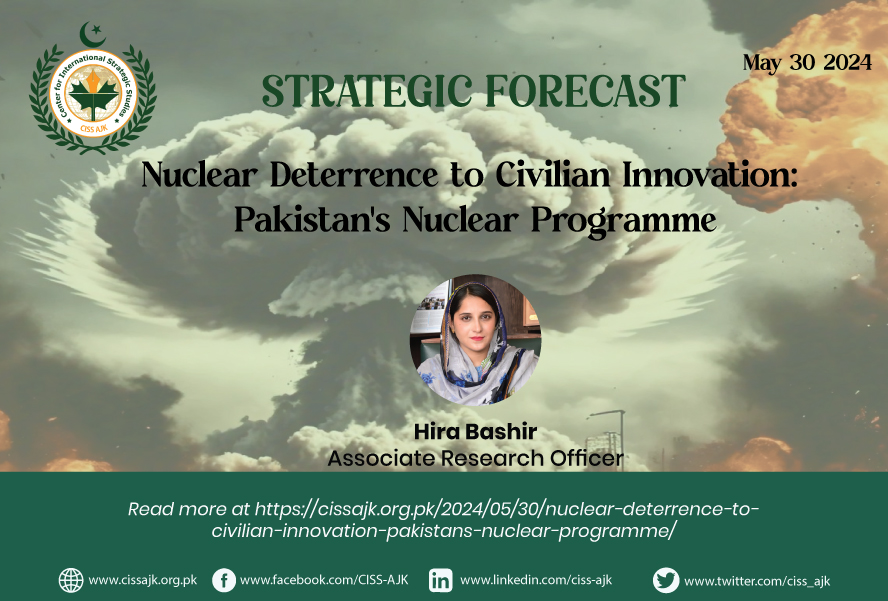Youm-e-Takbeer, or the Day of Greatness, is a significant day for Pakistanis, marking the country’s achievement of becoming a nuclear power. Celebrated every year on May 28th, the nation commemorates Pakistan’s successful nuclear tests in 1998, making it the world’s seventh nuclear-armed nation. This day is more than just a celebration; it symbolizes the nation’s resilience, determination, and strategic capability. Over time, Pakistan has created a strong system to manage and control its nuclear weapons, with strict laws and safety rules that follow international standards. DG IAEA, Rafael Grossi has also stated that Pakistan’s nuclear program is one of the safest and most secure in the world and has not fallen victim to nuclear terrorism to date.
The journey of Pakistan within the nuclear sphere, shows the resilience of the Pakistan in strategic domain and its determination towards aforesaid goal. Pakistan had managed its nuclear stockpile adequately, while maintaining safety measures and being responsive to the requirements of the international norms and laws, and it has gained appreciation for being a responsible nuclear power.
Why Nuclear weapons are important for Pakistan?
Pakistan’s nuclear weapons are meant to deter its larger and stronger neighbor, India, from attacking. The threat of nuclear retaliation restricts India from taking actions that could lead to a big conflict. Pakistan’s nuclear arsenal balances India’s military strength, making both sides more equal and less likely to act aggressively. This balance makes the region safer because neither side can win a major military advantage without facing disastrous consequences. Pakistan’s possession of nuclear weapons coerces India to exercise prudence in South Asia. India has a compelling interest in avoiding a nuclear exchange because of the devastation it would cause to civilians and the environment. The fear of any situation escalating and causing a huge disaster pushes India to choose diplomacy over risky military actions
Nuclear weapons provide a level of stability between India and Pakistan during heightened tensions or crises. Pakistan’s nuclear deterrence forces both nations to exercise strategic restraint and logical decision-making. It compels leaders to consider the consequences of their actions, making them less likely to make rash choices that could worsen the situation.
The world closely monitors the issue of nuclear weapons in South Asia.
The development of the nuclear weapons arsenal for Pakistan has been considered to be one of the factors that made this country more secure and stable when viewed in the regional context. This is because it assured regional predictability and deterrence. Leaders have realized that they would be the bearers of the damages of massive destruction and that is why they find non-aggressive and diplomatic ways to solve conflicts since they might be struck back which would be too bad, that’s why they look for other options.
Peace in South Asia is also maintained through the presence of nuclear weapons. The strategic nuclear weapons program of Pakistan has a pivotal role in moving the South- Asian continent away from a large-scale confrontation, as it has become a serious deterrent in case of any aggression. It also balances the power between the two sides of the conflict, as it helps to freeze the fight. However, both India and Pakistan should also find ways for dialogue, trust levels, commondoms, and diplomatic actions as ways to build up their relationships.
Pakistan is utilizing nuclear energy for civilian purposes apart from the actual use of nuclear deterrence. Thus, Pakistan’s civil nuclear program, guided by the Pakistan Atomic Energy Commission (PAEC), is deliberately employing nuclear science in different fields such as medicine, energy, agriculture, and climate change. The measures taken by PAEC have resulted in the creation of Nuclear power plants that currently have targets of generating a nuclear power capacity of 8800 MW by the year 2030.Pakistan agriculture sector has experienced improvements in pests and diseases management, plant nutrition and Biotechnology through nuclear technology. Collaboration with the International Atomic Energy Agency (IAEA) has also boosted Pakistan agriculture production.Moreover, the research done by PAEC encompasses nuclear and chemical sectors as institutions like PINSTECH are key players in promotion of nuclear technology for peaceful purposes. Pakistan has set a strong commitment to nuclear safety and security and these standards have got International recognition by IAEA time and again.

